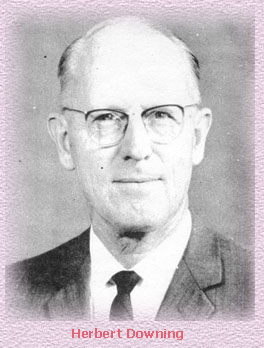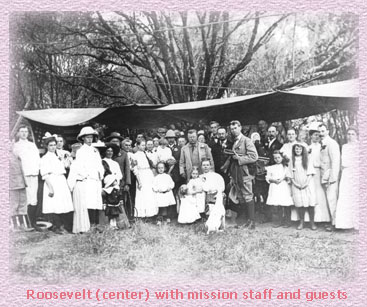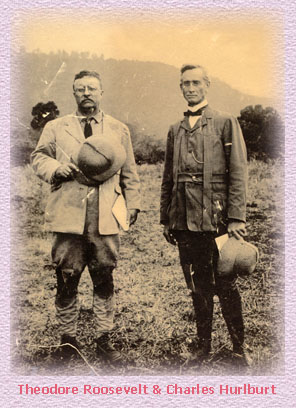
Excerpt (approximately 7.5 minutes) from the oral history with Herbert Downing
(Collection 251T1), who was interviewed by Robert Shuster in 1983. For more information
about Downing,
click here. 
INTERVIEWER: Tell me, what are your earliest memories of Kenya?

DOWNING: I think the thing that stands out most clearly is when ex-President Theodore
Roosevelt came out there on his hunting trip. I was only about five years old, but....
The...Mr...Mr. C.E. Hurlburt, the General Director, invited the white settlers of that area to come
to the station at Kijabe for the purpose of meeting the ex-President and also for a time together
with a luncheon. And that was quite a gala day, seeing the settlers coming in driving ox-carts
and what they called mule garies. A gary is a sort of an anglicized word for...in African
language for a vehicle. But that was quite an affair. Then before Theodore Roosevelt left the
station, they laid the cornerstone for the Rift Valley Academy. And many of the tourists or a lot
of the tourists that come to Kenya and want to see a mission station usually come to Kijabe and
that is one of the points of interest. That's [clears throat]...the cornerstone is rather rough hewn,
but I venture to say that there are few cornerstones of buildings that have had more photographs
taken of it.

INTERVIEWER: We...we have some photographs in the Archives of that...
DOWNING: Occasion.
INTERVIEWER: ...event and a copy of Roosevelt's speech.
DOWNING: Well, it was...there was a picture taken of that crowd that day and my sister and my
father and mother and my baby brother were in it, but I was too interested in things that were
going on behind the scenes [laughs] to appear for the picture.
INTERVIEWER: Do you recall anything about Roosevelt or his talk?
DOWNING: No. I just remember that he was quite an imposing character, speaker. And as a
boy I found a lot of interest in reading the book that he wrote after his trip there called African
Game Trails. I've been...even been trying to find a copy of it, but have un...have been
unsuccessful so far. [In October 2000 copies were available at Amazon.com.]
INTERVIEWER: How did...how did Hurlburt know Roosevelt?
DOWNING: Well, I don't know...I don't know whether in the archives of the African Inland
Mission whether they kept a record of that story, but I remember...I can remember my father on
deputation tours in this country telling the account of how that happened, often enough that it
seemed like I could almost...would almost be there.
The mission was actually started (as they
have that already written up) by Peter Cameron Scott, and after he died Reverend C.E. Hurlburt
 was appointed general director. He made a trip to the
field to assess the possibilities of
continuing to work as a mission and was very enthusiastic about it when he came back to this
country. He got together a group of Bible school students from the Bible Institute of
Pennsylvania, I believe is the title of it, in...in Philadelphia, and went out with this party and
began working the program that Peter Cameron Scott had
envisioned. Then he came home to
report on it and essentially to raise money, although they didn't make appeals. He was scheduled
to speak to some churches in Washington DC, and the ex-President either saw in the paper or had
called to his attention the fact that a missionary from British East Africa was to be in Washington
DC giving talks and he'd sent a message to Reverend Hurlbur...Hurlburt and asked him if he
would come to the White House to...for an interview. And he went. They had the interview, and
the ex-President was interested in knowing about the climate and the sort of things that he should
plan in his paraphernalia for going on this trip. And Mr. Hurlburt was quite happy give
him...answer the questions that asked. And then when they were finished Mr. Hurlburt [pauses]
or the President...the ex-President said to Mr. Hurlburt, "Now, I want you to know that I am very
grateful for the help you've given me in planning my trip to British East Africa. Is there
anything, by the way, that I could do in my...while I am still at my position as President that
would be of help to your work?" And he said...he hadn't thought of it before hand, but Mr.
Hurlburt thinking very rapidly remembered that they were trying to get into Belgian Congo. And
the local officials, it being a different religious persuasion [Roman Catholic] than...than a
Protestant mission would be, had just flatly denied the permits to go in. And so Mr. Hurlburt
told the President what the situation was and he said, "If there was any way that you could help
us get a permit to continue our work westward toward Lake Chad," which was the ultimate goal
of the mission organization, "it would be very much appreciated by us." And he says, "I think I
can do something about that." So it's reported that the President subsequently saw the
ambassador from Belgium and the permit came through in writing from the...whatever the top
official was in Belgium that Africa Inland Mission had the rights and privileges of entering and
establishing mission stations. So that was the introduction...the...what transpired between Mr.
Hurlburt and the President and then when he came to the field, of course, they got in touch with
each other and what I just told you was what transpired then.
was appointed general director. He made a trip to the
field to assess the possibilities of
continuing to work as a mission and was very enthusiastic about it when he came back to this
country. He got together a group of Bible school students from the Bible Institute of
Pennsylvania, I believe is the title of it, in...in Philadelphia, and went out with this party and
began working the program that Peter Cameron Scott had
envisioned. Then he came home to
report on it and essentially to raise money, although they didn't make appeals. He was scheduled
to speak to some churches in Washington DC, and the ex-President either saw in the paper or had
called to his attention the fact that a missionary from British East Africa was to be in Washington
DC giving talks and he'd sent a message to Reverend Hurlbur...Hurlburt and asked him if he
would come to the White House to...for an interview. And he went. They had the interview, and
the ex-President was interested in knowing about the climate and the sort of things that he should
plan in his paraphernalia for going on this trip. And Mr. Hurlburt was quite happy give
him...answer the questions that asked. And then when they were finished Mr. Hurlburt [pauses]
or the President...the ex-President said to Mr. Hurlburt, "Now, I want you to know that I am very
grateful for the help you've given me in planning my trip to British East Africa. Is there
anything, by the way, that I could do in my...while I am still at my position as President that
would be of help to your work?" And he said...he hadn't thought of it before hand, but Mr.
Hurlburt thinking very rapidly remembered that they were trying to get into Belgian Congo. And
the local officials, it being a different religious persuasion [Roman Catholic] than...than a
Protestant mission would be, had just flatly denied the permits to go in. And so Mr. Hurlburt
told the President what the situation was and he said, "If there was any way that you could help
us get a permit to continue our work westward toward Lake Chad," which was the ultimate goal
of the mission organization, "it would be very much appreciated by us." And he says, "I think I
can do something about that." So it's reported that the President subsequently saw the
ambassador from Belgium and the permit came through in writing from the...whatever the top
official was in Belgium that Africa Inland Mission had the rights and privileges of entering and
establishing mission stations. So that was the introduction...the...what transpired between Mr.
Hurlburt and the President and then when he came to the field, of course, they got in touch with
each other and what I just told you was what transpired then.
For more information about Downing or Collection 251
click here. To read the entire transcript from which this excerpt was taken, click here.
We'd like to know what you think of this exhibit. Feel free to send us
an e-mail message at
with your comments or questions.
Continue to the next excerpt of Consuella York.
Last Revised: 12/20/01
Expiration: indefinite
 was appointed general director. He made a trip to the
field to assess the possibilities of
continuing to work as a mission and was very enthusiastic about it when he came back to this
country. He got together a group of Bible school students from the Bible Institute of
Pennsylvania, I believe is the title of it, in...in Philadelphia, and went out with this party and
began working the program that Peter Cameron Scott had
envisioned. Then he came home to
report on it and essentially to raise money, although they didn't make appeals. He was scheduled
to speak to some churches in Washington DC, and the ex-President either saw in the paper or had
called to his attention the fact that a missionary from British East Africa was to be in Washington
DC giving talks and he'd sent a message to Reverend Hurlbur...Hurlburt and asked him if he
would come to the White House to...for an interview. And he went. They had the interview, and
the ex-President was interested in knowing about the climate and the sort of things that he should
plan in his paraphernalia for going on this trip. And Mr. Hurlburt was quite happy give
him...answer the questions that asked. And then when they were finished Mr. Hurlburt [pauses]
or the President...the ex-President said to Mr. Hurlburt, "Now, I want you to know that I am very
grateful for the help you've given me in planning my trip to British East Africa. Is there
anything, by the way, that I could do in my...while I am still at my position as President that
would be of help to your work?" And he said...he hadn't thought of it before hand, but Mr.
Hurlburt thinking very rapidly remembered that they were trying to get into Belgian Congo. And
the local officials, it being a different religious persuasion [Roman Catholic] than...than a
Protestant mission would be, had just flatly denied the permits to go in. And so Mr. Hurlburt
told the President what the situation was and he said, "If there was any way that you could help
us get a permit to continue our work westward toward Lake Chad," which was the ultimate goal
of the mission organization, "it would be very much appreciated by us." And he says, "I think I
can do something about that." So it's reported that the President subsequently saw the
ambassador from Belgium and the permit came through in writing from the...whatever the top
official was in Belgium that Africa Inland Mission had the rights and privileges of entering and
establishing mission stations. So that was the introduction...the...what transpired between Mr.
Hurlburt and the President and then when he came to the field, of course, they got in touch with
each other and what I just told you was what transpired then.
was appointed general director. He made a trip to the
field to assess the possibilities of
continuing to work as a mission and was very enthusiastic about it when he came back to this
country. He got together a group of Bible school students from the Bible Institute of
Pennsylvania, I believe is the title of it, in...in Philadelphia, and went out with this party and
began working the program that Peter Cameron Scott had
envisioned. Then he came home to
report on it and essentially to raise money, although they didn't make appeals. He was scheduled
to speak to some churches in Washington DC, and the ex-President either saw in the paper or had
called to his attention the fact that a missionary from British East Africa was to be in Washington
DC giving talks and he'd sent a message to Reverend Hurlbur...Hurlburt and asked him if he
would come to the White House to...for an interview. And he went. They had the interview, and
the ex-President was interested in knowing about the climate and the sort of things that he should
plan in his paraphernalia for going on this trip. And Mr. Hurlburt was quite happy give
him...answer the questions that asked. And then when they were finished Mr. Hurlburt [pauses]
or the President...the ex-President said to Mr. Hurlburt, "Now, I want you to know that I am very
grateful for the help you've given me in planning my trip to British East Africa. Is there
anything, by the way, that I could do in my...while I am still at my position as President that
would be of help to your work?" And he said...he hadn't thought of it before hand, but Mr.
Hurlburt thinking very rapidly remembered that they were trying to get into Belgian Congo. And
the local officials, it being a different religious persuasion [Roman Catholic] than...than a
Protestant mission would be, had just flatly denied the permits to go in. And so Mr. Hurlburt
told the President what the situation was and he said, "If there was any way that you could help
us get a permit to continue our work westward toward Lake Chad," which was the ultimate goal
of the mission organization, "it would be very much appreciated by us." And he says, "I think I
can do something about that." So it's reported that the President subsequently saw the
ambassador from Belgium and the permit came through in writing from the...whatever the top
official was in Belgium that Africa Inland Mission had the rights and privileges of entering and
establishing mission stations. So that was the introduction...the...what transpired between Mr.
Hurlburt and the President and then when he came to the field, of course, they got in touch with
each other and what I just told you was what transpired then.

